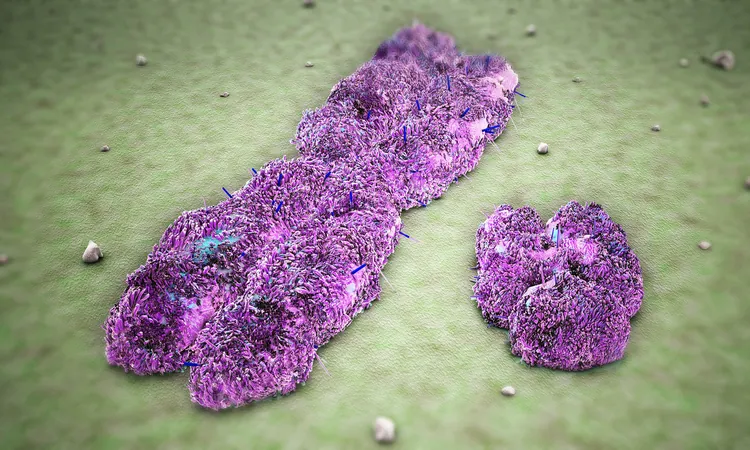
The Vanishing Y Chromosome: Are Men in Trouble?
2025-06-17
Author: Lok
Is the Y Chromosome Disappearing?
Crack open a biology textbook, and you’ll find a basic truth: two X chromosomes result in a girl, while an X and Y pair means a boy. The diminutive Y chromosome is home to the SRY gene, which ignites testis development. For over 300 million years, this setup has effectively defined male genetics. But recent whispers in genetic circles suggest something may be off.
The Future of the Y Chromosome
The Y chromosome has steadily been losing its genetic material, and recent computer models predict it could vanish entirely in about 11 million years. This isn’t just theoretical; the implications could affect everything from cancer susceptibility to reproductive methods for future humans. Would this lead to the extinction of men, or could life adapt and discover new methods of male development?
Mammalian Adaptations and Evolutionary Surprises
In a fascinating twist, some mammals have continued to produce males even without a Y chromosome. Research has shown that certain rodent species, like the Japanese spiny rat, have entirely bypassed the need for this chromosome by adapting their genetic framework. In these rodents, a duplication near the SOX9 gene allows for male characteristics to emerge without the Y chromosome.
Health Risks Tied to Y Chromosome Loss
While species may find new paths forward, individual men are already facing consequences. Starting in their fifties, many lose the Y chromosome at the cellular level, leading to what’s termed “mosaic loss of Y.” Studies suggest that by the age of 80, a staggering 40% of men exhibit significant Y chromosome loss in their blood cells, correlating with increased rates of disease and a staggering decrease in lifespan.
The Immune System Connection
The Y chromosome houses the UTY gene, crucial for immune function. Without it, some immune cells begin to malfunction, potentially heightening cancer risk. Research indicates that tumors grow faster in the absence of the Y chromosome, although certain types of cancer may respond better to treatment when this chromosome is missing.
Coping with Y Chromosome Loss
Environmental factors such as pollution and chemical exposures can exacerbate Y chromosome loss. Adopting healthier lifestyle choices—like quitting smoking and eating a balanced diet—could help preserve this vital chromosome. Emerging therapies are being tested to counteract some of the damage caused by Y loss.
The Road Ahead
The resilient Japanese spiny rat suggests that mammals can adapt if the Y chromosome disappears. However, this doesn’t ease the worries of men already experiencing Y loss. This intersection of evolutionary success and individual health risks will likely shape discussions in both medical and scientific arenas in the future.
In conclusion, while the Y chromosome may be on borrowed time, simple lifestyle choices can help men preserve their genetic heritage. Watching for new research on this topic could unveil the next steps in our understanding of this quirky yet essential chromosome. Men, it’s time to take proactive steps for your health!



 Brasil (PT)
Brasil (PT)
 Canada (EN)
Canada (EN)
 Chile (ES)
Chile (ES)
 Česko (CS)
Česko (CS)
 대한민국 (KO)
대한민국 (KO)
 España (ES)
España (ES)
 France (FR)
France (FR)
 Hong Kong (EN)
Hong Kong (EN)
 Italia (IT)
Italia (IT)
 日本 (JA)
日本 (JA)
 Magyarország (HU)
Magyarország (HU)
 Norge (NO)
Norge (NO)
 Polska (PL)
Polska (PL)
 Schweiz (DE)
Schweiz (DE)
 Singapore (EN)
Singapore (EN)
 Sverige (SV)
Sverige (SV)
 Suomi (FI)
Suomi (FI)
 Türkiye (TR)
Türkiye (TR)
 الإمارات العربية المتحدة (AR)
الإمارات العربية المتحدة (AR)